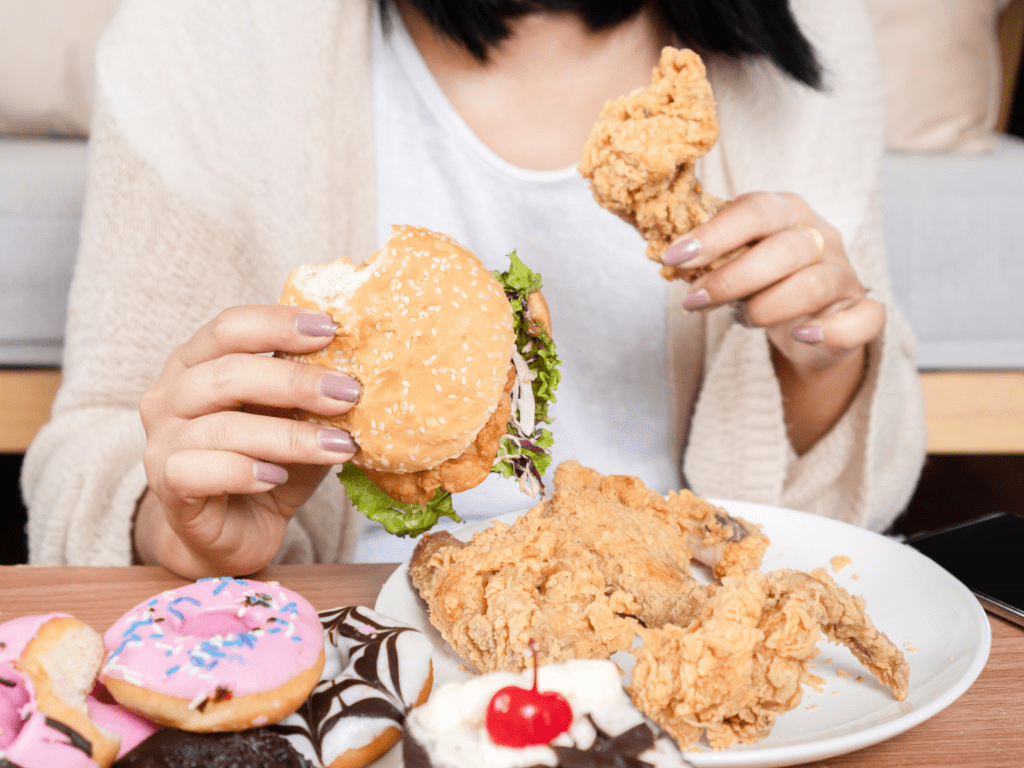
Here’s the truth: Binge eating isn’t just about food. It’s about everything underneath: the emotions, the habits, the restrictions, and the shame cycle that keeps it all spinning. If you’ve ever found yourself staring at an empty plate, wondering, Why can’t I stop bingeing?—you’re not alone. And here’s the good news: there’s a way out.
Binge eating can feel like this secret battle you’re fighting—one that leaves you feeling defeated, guilty, and stuck in a cycle of “never again” promises that don’t stick. But let’s take a deep breath and set that guilt aside. This isn’t about blame or willpower. It’s about understanding what’s really going on and finding tools to break free.
This guide is here to walk you through exactly that. No judgment, no “just try harder” nonsense—just real, practical steps toward healing your relationship with food, your body, and yourself.
Because here’s the thing: binge eating isn’t who you are. It’s a pattern, a response, and—most importantly—something you can change.
Ready? Let’s dive in.
What is Binge Eating, and How Can You Stop?
Let’s get real—binge eating isn’t just about having seconds or enjoying dessert a little too much on a holiday. It’s a deeply emotional, often overwhelming experience that leaves you feeling like food has completely taken over your life.
And let me tell you, if you’ve ever found yourself elbow-deep in a bag of chips while telling yourself, “I’ll stop after this handful… okay, maybe this one,” you’re not alone. Binge eating doesn’t mean you lack willpower or that something’s “wrong” with you. It’s a response—your body and mind’s way of yelling, “Something’s not working here!”
What Does Binge Eating Look Like?
Here’s the thing: binge eating is about more than the food. It’s about the emotions, the patterns, and the aftershocks. Some common signs include:
- Eating way more than feels comfortable—and feeling like you can’t stop.
- Doing it in secret—because the shame monster is whispering, “Don’t let anyone see this.”
- Feeling awful afterward—hello, guilt, shame, and that dreaded regret spiral.
Sound familiar? Let’s keep going.
Why Does It Happen?
Binge eating often starts with restriction. You know, those diet rules that tell you carbs are the enemy, or that you need to “earn” dessert. When you deprive your body of the nourishment it needs—or label certain foods as “bad”—you set yourself up for a backlash.
Here’s how it usually plays out:
- You restrict: You’re “good” all day, skipping meals or saying no to the foods you love.
- You obsess: Suddenly, all you can think about is bread. Or chocolate. Or bread and chocolate.
- You binge: You give in—but not in a way that feels joyful or satisfying. It’s frantic, overwhelming, and all-consuming.
- You feel awful: The shame rolls in. So you vow to restrict again tomorrow, and the cycle starts all over.
Sound exhausting? It is. But that’s not all.
The Emotional Side of Binge Eating
Binge eating isn’t just about food; it’s a way of coping. Stress, sadness, loneliness, boredom—these emotions are loud, and food can feel like a quick way to quiet them. But here’s the kicker: the relief is temporary, and the underlying feelings are still there, waiting for you when the food is gone.
Breaking the Cycle of Binge Eating
Alright, now that we’ve laid it all out, let’s talk solutions. Because here’s the truth: you can break free from the binge-restrict cycle. It’s not about “trying harder” or finding the next magical diet (spoiler: they don’t exist). It’s about shifting your mindset, reconnecting with your body, and creating sustainable habits that honor your needs. The cool thing? Learning how to stop binge eating opens the door for so much healing in your life.
Step 1: Ditch the Diet Mentality
If you’ve been stuck in the diet loop, it’s time to burn the rule book. Dieting creates scarcity—both physically and emotionally. And scarcity? It’s binge eating’s best friend. When you restrict, you’re setting yourself up to crave everything you’ve labeled “off-limits.”
So, how do you ditch the diet mentality and stop binge eating for good?
- Stop labeling foods as “good” or “bad.” Food is just food. A cookie doesn’t have moral value, and eating one doesn’t make you “bad.”
- Focus on adding, not subtracting. Instead of cutting things out, think about what you can add to your meals to make them more satisfying—like healthy fats, protein, or carbs that make you happy.
- Practice permission. Allow yourself to eat what you want, when you want it. This might feel scary at first, but trust me—when the “forbidden” loses its power, those overwhelming cravings start to fade.
Step 2: Reconnect with Your Body
Your body isn’t the enemy here. In fact, it’s been trying to tell you what it needs all along. Rebuilding trust with your body takes time, but it’s absolutely worth it when you want to stop bingeing.
Here’s how to start:
- Learn your hunger cues. Are you eating because you’re genuinely hungry, or because you’re bored, stressed, or trying to avoid something? There’s no judgment here—just curiosity.
- Slow down. When you eat, take a breath. Notice the flavors, textures, and how your body feels as you go. The goal isn’t to “eat perfectly”—it’s to stay present and tune in.
- Stop eating when you’re satisfied. This one can feel tricky, especially if you’re used to overeating out of fear or habit. But when you practice listening to your body, it’ll start to tell you when it’s had enough.
Step 3: Address the Emotional Triggers
Let’s get real: binge eating isn’t just about food. It’s about emotions. If you’re using food to cope with stress, sadness, or other big feelings, it’s time to build some new tools for your emotional toolbox.
- Start journaling. Write it out—what are you feeling, and what do you actually need in that moment? Sometimes, just putting it on paper can give you clarity.
- Find other coping mechanisms. Call a friend, go for a walk, dance it out in your living room—find what works for you to release emotions without turning to food.
- Be kind to yourself. Self-compassion isn’t optional here. When the shame spiral starts, remind yourself that you’re human, and you’re learning. Progress, not perfection is key when learning how to stop binge eating.
Step 4: Build a Support System
You don’t have to do this alone. Overcoming binge eating is hard work, and having a support system can make all the difference.
- Talk to someone you trust. Whether it’s a friend, family member, or coach, sharing your experience can help you feel less alone.
- Consider professional help. A therapist or counselor can help you unpack the deeper layers of your relationship with food and guide you toward healing.
- Join a community. Surrounding yourself with like-minded people who understand what you’re going through can be incredibly empowering.
Step 5: Celebrate the Wins—Big and Small
Recovery isn’t linear, and it’s not about never bingeing again. It’s about learning, growing, and creating a healthier relationship with food and yourself.
- Did you stop mid-binge and check in with yourself? Celebrate that.
- Did you allow yourself to eat something without guilt? That’s a win.
- Did you show up for yourself today, even in a small way? Huge.
The more you celebrate these moments, the more you’ll start to see your progress—and that’s what fuels long-term change.
Long-Term Strategies for Overcoming Bingeing
Now that we’ve explored the initial steps to breaking free from binge eating, let’s focus on sustaining that freedom. This isn’t just about avoiding binges—it’s about creating a life where food no longer holds power over you and you feel at home in your body.
Prioritize Consistency Over Perfection
Let’s be clear: this isn’t about nailing it every single day. Recovery isn’t linear, and life happens. The goal is to focus on consistency over perfection.
- Create flexible routines. Plan meals and snacks that nourish you, but leave room for spontaneity. Life is too short to miss out on ice cream with friends because it wasn’t “on the plan.”
- Normalize all foods. Keeping a variety of foods in your home—yes, even the ones you’ve previously binged on—helps reduce their power over time.
- Learn from slip-ups. A binge doesn’t mean you’ve failed. It’s a signal to check in: What triggered it? What can you learn? Every experience has value.
Stay Connected to Your “Why”
Why are you doing this work? What’s your vision for a life free from food obsession? When things feel tough, reconnect with your deeper motivation.
- Write it down: What does food freedom mean to you? How will it feel? Who will you be?
- Create reminders: A journal entry, a vision board, or even a sticky note on your mirror can keep your why front and center.
- Celebrate your progress: Reflect on how far you’ve come, not just in your relationship with food, but in all areas of life.
Focus on Holistic Self-Care
True freedom from binge eating is about so much more than food. It’s about taking care of your whole self—mind, body, and spirit.
- Nurture your body. Move in ways that feel joyful, get enough sleep, and fuel yourself with foods that make you feel good.
- Care for your mind. Practice mindfulness, gratitude, or meditation to quiet the noise and stay present.
- Honor your emotions. Allow yourself to feel whatever comes up without judgment. Journaling or talking to a trusted friend can help process those emotions.
Keep Setting Boundaries with Diet Culture
Diet culture doesn’t just disappear. It’s loud, persistent, and everywhere. To maintain your food freedom, you’ll need to continue standing firm against it.
- Unfollow triggering accounts. Social media can be a minefield of harmful messaging. Fill your feed with body-positive and food-neutral content instead.
- Speak up. If friends or family start talking about diets or body shaming, redirect the conversation or let them know it’s not something you engage with anymore.
- Protect your mental space. Whether it’s avoiding certain TV shows, unsubscribing from weight-loss emails, or skipping events centered around dieting, prioritize what keeps you grounded.
Invest in Continuous Growth to Stop Binge Eating
Freedom from binge eating is an ongoing journey. Keep learning, growing, and evolving.
- Read books on body trust and intuitive eating. Knowledge empowers you to deepen your understanding and commitment to this path.
- Work with a coach or therapist. Having a guide on this journey can provide invaluable support and accountability.
- Stay curious. Every step of this journey offers an opportunity to discover more about yourself.
Celebrate Life Beyond Food
As you build a life free from binge eating, you’ll start to notice all the space that opens up—space for joy, connection, creativity, and purpose. Lean into it.
- Explore new hobbies. Whether it’s painting, hiking, or learning a new language, fill your life with things that light you up.
- Deepen your relationships. Without food as a buffer, you’ll have more energy to connect authentically with others.
- Dream big. What do you want your life to look like? Start taking steps toward making that vision a reality.
Final Thoughts: Freedom from Binge Eating Is Worth the Fight
Learning how to stop binge eating isn’t just about changing your relationship with food. It’s about reclaiming your life—your joy, your confidence, your ability to be fully present. It’s not easy, but it’s so worth it.
Take it one day, one meal, one moment at a time. Be kind to yourself. Trust that you have everything you need within you to create a life of freedom, balance, and peace.
If you’re ready to break free from binge eating and embrace true food freedom, let’s take the first step together.
📅 Schedule your complimentary discovery call today: https://annesophie.us/discovery
This is your time to reclaim your relationship with food, your body, and your life. You don’t have to do this alone—let’s start this journey together. 💖







